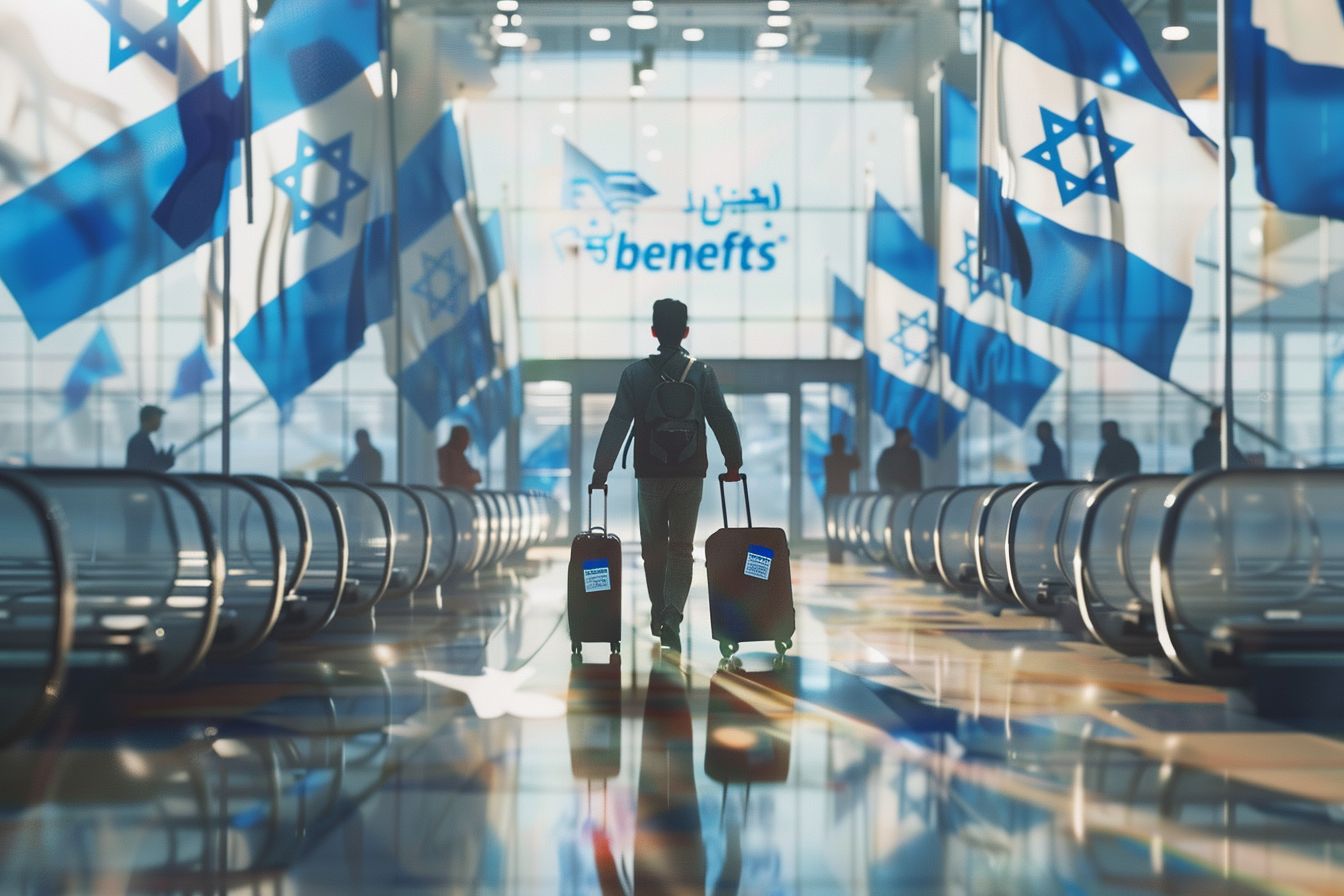In this Guide:
Planning a trip to Israel? This Israel packing list has everything you need—from beachwear to modest clothes for holy sites. We’ve helped hundreds of travelers prep smart, pack light, and avoid rookie mistakes. Whether you're here for a week or a year, we’ve got your suitcase sorted.
Key Takeaways
- You need to pack for multiple climates in Israel — from beach heat to chilly Jerusalem nights — so layering and planning by season is essential.
- Modest clothing is a must for religious sites, so don’t forget long pants, scarves, and covered shoulders.
- Essential documents and tech gear like passport copies, travel insurance, and plug adapters (Type H) will save you serious stress.
- Don't overpack — use smart strategies like packing cubes, rolling clothes, and a reusable checklist to bring only what you need.
What to Include in Your Israel Packing List?
Your Israel packing list should be your go-to checklist for everything you’ll need across Israel’s wild mix of climates, cultures, and experiences. From sacred synagogues to sizzling beach towns, packing right means planning for it all.
Include light layers, modest clothes for religious sites, sturdy shoes, and essentials like power adapters and travel documents. Whether you're moving to Israel, coming for school, or just traveling, tailoring your list to your season, itinerary, and region makes all the difference.
Don't forget beach gear, tech chargers, and sun protection—you’ll thank us in the Negev.
Why is an Israel Packing List Important?
Because packing for Israel isn’t like throwing flip-flops in a bag for a weekend in Greece. From the desert heat of Eilat to the cool hills of Jerusalem, weather shifts fast. A solid packing list keeps you comfortable, respectful, and stress-free.
You'll also want to be prepared for religious sites, which often require modest dress—especially in cultural hotspots like the Old City. Activities vary too: hiking Masada, floating in the Dead Sea, or exploring Tel Aviv nightlife all require very different outfits.
And here's the kicker—overpacking can cost you! Many tourists buy what they forgot at inflated prices. A good list? It saves space, money, and panic. It’s your secret weapon for traveling smart.
When Should You Start Packing for Israel?
Start at least 1–2 weeks before takeoff—trust us, you’ll avoid last-minute chaos. Israel’s seasons vary wildly, so always check the forecast for Tel Aviv, Jerusalem, or wherever you're headed.
Here’s how to prep smart:
- Make a digital or paper checklist
- Order any specialty items early (modest swimwear, adapters)
- Sort important documents first
- Plan laundry if staying long-term
This gives you time to pack thoughtfully—not frantically.
What Clothing Should I Pack for Israel?
Packing clothes for Israel means thinking practical, modest, and weather-ready. You’ll be navigating city streets, religious sites, beaches, and maybe even hiking trails—all in one trip.
Modest Clothing for Religious Sites
- Tops that cover shoulders
- Skirts or pants that cover knees
- Scarves or shawls for head coverings (especially for women)
- Lightweight layers to adjust on the go
Casual Daywear
- Breathable t-shirts and shorts
- Comfortable jeans or travel pants
- Sun hat and sunglasses for protection
- Lightweight long sleeves for sun or modesty needs
Beach Attire
- Swimsuits and a cover-up
- Flip flops or water shoes
- Quick-dry towel
Seasonal Considerations
- Summer: moisture-wicking shirts, UV wear
- Winter: warm layers, light jacket, rain gear
- Spring/Fall: mix of layers for changing temps
Evening/Dining Out
- A casual-nice outfit for restaurants or events
- Light sweater for cooler evenings
Packing smart helps you transition from a Tel Aviv beach day to Shabbat dinner in Jerusalem without missing a beat.
How Should I Pack for Israel's Climate and Weather?
Israel’s weather can surprise you. From humid Tel Aviv summers to snowy Golan winters, your packing should match the season—and the region.
Summer Essentials (June–September)
- High-SPF sunscreen
- Wide-brim hat or neck wrap
- Loose, breathable clothing
- Hydration pack or reusable bottles
Winter Necessities (December–February)
- Waterproof jacket
- Layered tops and warm pants
- Umbrella for sudden rain
- Cozy pajamas—many rentals aren’t well-heated
Spring & Fall Tips
- Layer-friendly clothing
- Light waterproof gear
- UV protection (yes, even in cooler temps)
- Durable walking shoes for surprise showers
If you're planning an extended stay or moving, check out our full guide on life in Israel and what to expect season by season.
What Footwear Should I Bring to Israel?
Shoes can make or break your trip. Israel’s cobblestones, desert trails, and beach paths demand versatile footwear.
Best Choices:
- Broken-in walking shoes for daily wear
- Sturdy sandals with heel straps (Teva-style)
- Hiking boots if you’re hitting national parks
- Water shoes for the Dead Sea and rocky shores
- Slip-on shoes for religious sites or homes
Choose shoes with non-slip soles—ancient stone streets can be slick. Quick-dry materials also help when transitioning from the beach to the city. Dressy flats or loafers are perfect for nicer dinners or Shabbat plans.
What Essential Documents Do I Need for Israel?
Don’t land in Israel without your most important travel companion: paperwork. Having these documents organized will save you major headaches at borders, banks, and medical offices.
Must-Have Travel Docs:
- Passport (valid at least 6 months beyond your return date)
- Flight confirmations (printed + digital)
- Hotel bookings and local contacts
- Travel insurance policy and emergency contacts
Financial & Health:
- Credit/debit cards that work abroad
- A small amount of cash in shekels
- Prescription information and necessary meds
- Health insurance cards
Backup Like a Pro:
- Scan and save all documents to the cloud
- Email copies to yourself
- Store a printout in each suitcase
For long-term stays, check our guide on the Aliyah process for even more paperwork you’ll need to get settled.
What Electronics and Tech Should I Pack for Israel?
You don’t want to be the person stuck with a dead phone and the wrong charger in the middle of Jerusalem. Here’s how to stay charged and connected.
Power & Adapters:
- Type H (or C) plug adapters
- USB hub or multi-port charger
- Portable power bank for long tour days
Phones & Connectivity:
- Unlocked phone for a local SIM card
- Offline map & translation apps
- Backup battery or basic phone
Cameras & Entertainment:
- DSLR or compact camera (optional, phones work great)
- E-reader for downtime
- Headphones for flights and transit
If you're here to study or work remotely, check out the best universities in Israel for international students—they have specific tech needs too.
What Toiletries and Personal Items Should I Bring?
Don’t assume everything will be easy to find here—especially your favorite shampoo or medication. Bring what you know works for you.
Daily Musts:
- Toothbrush, toothpaste, floss
- Travel-sized shampoo & conditioner
- Deodorant, razor, grooming items
- Contact lens solution, if needed
Sun & Skin Care:
- SPF 50+ sunscreen
- Lip balm with SPF
- After-sun lotion or aloe
- Face moisturizer (Israel can be dry!)
First Aid & Extras:
- Basic meds: ibuprofen, allergy pills, antidiarrheals
- Band-aids and blister pads
- Motion sickness relief for buses
- Hand sanitizer and wipes
For a full look at what it's like navigating daily life here, explore our post on health care in Israel—especially useful for longer stays.
What Accessories Are Essential for Israel?
The right accessories can seriously level up your trip—from staying safe in the sun to keeping your valuables close.
Sun Protection
- UV sunglasses
- Wide-brim hat or cap
- Lightweight scarf for both sun and modesty
Practical Musts
- Day backpack or secure crossbody bag
- Reusable water bottle (1L+)
- Money belt or hidden pouch
- Quick-dry towel
Specialty Items
- Binoculars for nature reserves or birdwatching
- Old swimsuit for the Dead Sea
- Modest head covering for religious sites
Visiting for longer? Check out our guide on what life in Israel is really like before you arrive.
How Do I Pack for Religious and Cultural Sites in Israel?
Religious and cultural sites in Israel are awe-inspiring—but only if you’re dressed appropriately and show respect.
Clothing Rules:
- Shoulders and knees covered for men and women
- Scarves or shawls for women (especially at the Western Wall)
- Modest swimwear for gender-separated beaches
- Shoes that are easy to remove for mosques or homes
Items to Consider:
- Kippah (yarmulke) for Jewish sites
- Prayer shawl or religious texts if needed
- Quiet, respectful attire for churches
Cultural Awareness:
- No photos during prayer times
- Respect Shabbat restrictions in Jerusalem
- Modesty rules vary by neighborhood
Places like Masada or the Church of the Holy Sepulchre require not just the right clothes, but also sensitivity. Read our post on culture in Israel to understand the deeper context of these spaces.
What Special Items Should I Pack for Israel's Unique Attractions?
Israel’s diverse geography means your packing list might include some unexpected items. Here's what you'll need for the highlights.
Dead Sea:
- Old swimsuit (the salt can ruin fabric)
- Water shoes for rocky shores
- Flip-flops and lotion for post-soak skincare
- Small first-aid kit (salt stings cuts!)
Hiking and Nature:
- Hiking poles (especially for rocky terrain)
- Snacks and electrolytes
- Insect repellent
- Minimum 2L water capacity
Beach Days:
- Snorkeling mask (especially in Eilat)
- Reef-safe sunscreen
- Dry bag or waterproof phone case
- Water shoes for rocky coastline
Desert Travel:
- Portable shade (light tarp or hat with drape)
- Extra water storage
- Lip balm and lightweight long sleeves
Planning a desert trek or a hiking tour? Check out how to get your skipper license in Israel for more adventure ideas.
What Should I Pack for a Year-Long Stay in Israel?
Staying for a year? Welcome to the land of hummus and heatwaves! Long-term packing is all about balance: bring what you love, leave what you won’t use.
Seasonal Wardrobes:
- Clothes for hot summers AND rainy winters
- Compression bags to save space
- Mix-and-match staples you can layer
- Off-season storage solutions
Home Setup:
- Photos, a favorite mug, small decor
- Basic kitchen tools if your place is empty
- Streaming logins for Netflix nights
Work/School Gear:
- Laptop, charger, hard drive
- Native-language books or notes
- Stationery you like (Israeli notebooks hit different)
Real Talk:
We knew a girl who packed six pairs of boots… for Tel Aviv. She lasted three weeks before swapping half her suitcase for sandals. Learn from her.
And if you're preparing for Aliyah, don't miss our full guide to making Aliyah from the US. - and check out this US site where you can purchase all the gear in one convienient place!
What Are the Best Packing Tips and Strategies for Israel?
Packing for Israel isn’t just about what you bring—how you pack matters just as much. Here's how to avoid overstuffed luggage and “I forgot my charger” moments.
Space-Saving Tips:
- Roll your clothes—less bulk, fewer wrinkles
- Use packing cubes for categories
- Put socks inside shoes
- Pack plastic bags for dirty laundry
Weight Management:
- Wear your bulkiest items on the plane
- Weigh your suitcase ahead of time
- Leave room for souvenirs
- Balance items between checked and carry-on
Safety & Security:
- TSA-approved locks
- Keep important docs in your carry-on
- Store emergency info inside each bag
Smart Trick:
One of our team packed an entire first-aid kit... in Hebrew. Didn’t realize until she had to Google every label. Label your meds in your own language!
Curious how to send money to Israel while you’re here? We’ve got that covered too.
Wrap Up: Your Israel Packing List, Done Right
From flip-flops to prayer shawls, this Israel packing list has you prepped for every stop—from sandy beaches to spiritual landmarks. We’ve helped thousands of travelers, students, and new olim pack smarter and stress less.
Need more? Explore everything on our homepage to plan your best Israel adventure yet.
Related Posts
Discover more about life in Israel! Our related posts cover aliyah, culture, and where to live—everything you need to know about Israel.
Sign Up for our Newsletter
Enter your email to receive the latest news and updates.







